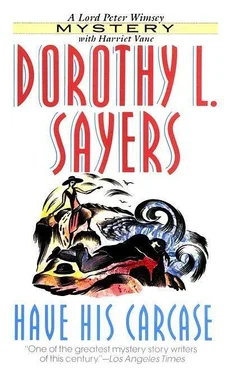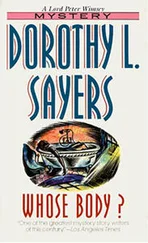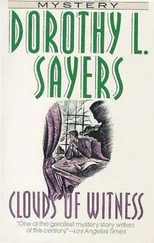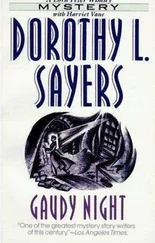‘How far is it?’ asked Harriet.
The girl opined that it was a good piece, but declined to commit herself in yards or miles.
‘Well, I’ll try there,’ said Harriet. ‘And if you meet anybody on the road, will you tell them there’s a dead man on the beach about a mile back and that the police ought to be told.’
The girl stared dumbly.
Harriet repeated the message, adding, ‘Do you understand?’
‘Yes, miss,’ said the girl, in the tone of-voice which makes it quite cleat that the hearer understands nothing.
As Harriet hurried away up the lane, she saw the girl still staring after her.
Will Coffin’s proved to be a small farmhouse. It took Harriet twenty minutes to reach it, and when she did reach it, it appeared to be deserted. She knocked at the door without result; pushed it open and shouted, still without result; then she went round to the back.
When she had again shouted several times, a woman in an apron emerged from an outbuilding and stood gazing at her.
‘Are any of the men about?’ asked Harriet.
The woman replied that they were all up. tothe seven-acre field, getting the hay in.
Harriet explained that there was a dead man lying on the shore and that the police ought to be informed,
‘That do be terrible, surely,’ said the woman. ‘Will it be Joe Smith? He was out with his boat this morning and the rocks be very dangerous thereabouts. The Grinders, we call them.’
‘No,’ said Harriet; ’it isn’t a fisherman — it looks like somebody from the town. And he isn’t drowned. He’s cut his throat’
‘Cut his throat?’ said the woman, with relish. ‘Well, now, what a terrible thing, to be sure.’
‘I want to let the police know,’—said Harriet, ‘before the, tide comes in and covers the body.’
‘The police?’ The woman considered this. ‘Oh, yes,’ she said, after mature thought. ‘The police did ought to be told about it.’
Harriet asked if one of the men could be found and sent with a message. The woman shook her head. They were getting in the hay and the weather did look to be changing. She doubted if anybody could be spared.
‘You’re not on the telephone, I suppose?’ asked Harriet.
They were not on the, telephone, but Mr Carey at the Red Farm, he was on the telephone. To get to the Red Farm, the woman added, under interrogation, you would have to go back to the road and take the next turning, and then it was about a mile or maybe two.
‘Was there a car Harriet could borrow?
The woman was sorry, but there was no car. At least, there was one, but her daughter had gone over to Heathbury market and wouldn’t be back till late.
‘Then I must try and get to the Red Farm,’ said Harriet, rather wearily. ‘If you do see anybody who could take a message, would you tell them that there’s a dead man on the shore near the Grinders, and that the police ought to be informed.’
‘Oh, I’ll tell them sure enough,’ said the woman, brightly. ‘It’s a very terrible thing, isn’t it? The police did ought to know about it., You’re looking very tired, miss would you like a cup of tea?’
Harriet refused the tea, and said she ought to be getting on. As she passed through the gate, the woman called her back. Harriet turned hopefully.
‘Was it you that found him, miss?’
‘Yes, I found him.’
‘Lying there dead?’
Yes.’
‘With his throat cut?’
‘Yes.’
‘Dear, dear,’ said the woman, “Tis a terrible thing, to be sure.’
Back on the main road, Harriet hesitated. She had lost a good deal of time on this expedition. Would it be better to turn aside again in search of the Red Farm, or to keep to the main road where there was more chance of meeting, a passerby? While still undecided, she arrived at the turn. An aged man was hoeing turnips in afield-close by. She hailed him.
‘Is this the way to the Red Farm?’
He paid no attention, but went on hoeing turnips.
‘He must be deaf,’ muttered Harriet, hailing him again. He continued to hoe turnips. She was looking about for the gate into the field when the aged man paused to straighten his back and spit on his hands, and in so doing brought her into his line of vision.
Harriet beckoned to him, and he hobbled slowly up to the wall, supporting himself on the hoe as he went.
‘Is this the way to the Red Farm?’ She pointed up the lane.
‘No,’ said the old man, ‘he ain’t at home.’
‘Has he got a telephone?’ asked Harriet.
‘Not till tonight,’ replied the ancient. ‘He’s over to Heathbury market?
‘A telephone,’ repeated Harriet, ‘has he got a telephone?’
‘Oh, ay,’ said the old man, ‘you’ll find her somewhere about.’ While Harriet was wondering whether the pronoun was the one usually applied in that county to telephones, he dashed her hopes by adding: ‘Her leg’s bad again.’
‘How far is it to the farm?’ shouted Harriet,desperately.
‘I shouldn’t wonder if ’twas,’ said the, old man, resting on the hoe, and lifting up his hat to admit the breeze to his head, ‘I tell’d her o’ Saturday night she hadn’t no call to do it’
Harriet, leaning far over the’ wall, advanced her mouth to within an inch of his ear.
‘How far is it?’ she bawled.
‘There ain’t no need to shout,’ said the old man. ‘I bain’t deaf. Eighty-two come Michaelmas, and all my faculties, thank God.’
‘How far—‘began Harriet.
‘I’m telling ‘ee, arnn’t I? Mile and half by the lane, but if you was to take the short cut through the field where the old bull is—’
A car came suddenly down the road at considerable speed and vanished into the distance.
‘Oh, bother!’ muttered Harriet, ‘I might have stopped that if I, hadn’t wasted my time on this old idiot.’
‘You’re quite right, miss,’ agreed Old Father William, catching the last word with the usual perversity of the deaf. ‘Madmen, I calls ’em. There ain’t no sense in racketing along at that pace. My niece’s young man—’
The glimpse of the car was a deciding factor in Harriet’s mind. Far better to stick to the road. If once she began losing herself in by-ways on the chance of finding an elusive farm and a hypothetical telephone, she might wander about till dinner-time. She started off again, cutting Father William’s story off abruptly in the middle, and did another dusty half mile without further encounter.
It was odd, she thought. During the morning she had seen several people and quite a number (comparatively) of tradesmen’s vans. What had happened to them all? Robert Templeton (or possibly even Lord Peter Wimsey, who had been brought up in the country) would have promptly enough found the answer to the riddle. It was market-day at Heathbury, and early-closing day at Wilvercombe and Lesston Hoe — the two phenomena being, indeed, interrelated so as to permit the inhabitants of the two watering-places to attend the important function at the market-town. Therefore there were no more tradesmen’s deliveries along the coast-road. And therefore all the local traffic to Heathbury was already well away inland. Such of the aborigines as remained were at work in the hayfields. She did, indeed, discover a man and a youth at work with a two-horse haycutter, but they stared aghast at her suggestion that they should leave their work and their horses to look for the police. The farmer himself was (naturally) at Heathbury market. Harriet, rather hopelessly, left a message with them and trudged on.
Presently there came slogging into view a figure which appeared rather more hopeful, a man clad in shorts and carrying a pack on his back — a hiker, like herself. She hailed him imperiously.
‘I say, can you tell me where I can get hold of somebody with a car or a telephone? It’s frightfully important.’
Читать дальше












